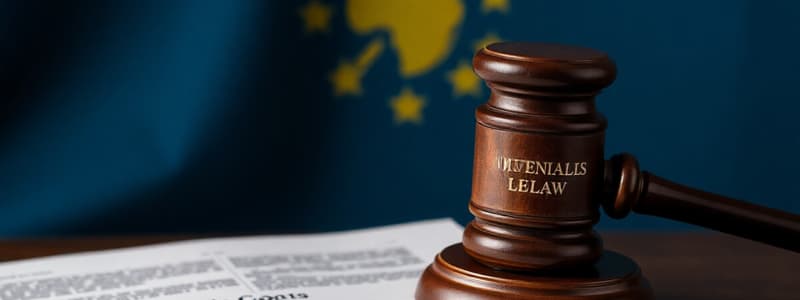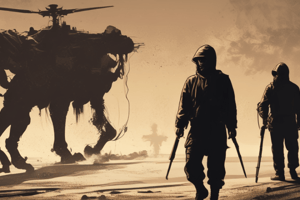Podcast
Questions and Answers
What is the main court for International Criminal Law (ICL)?
What is the main court for International Criminal Law (ICL)?
- The Special Tribunal for Lebanon
- The European Court of Human Rights
- The International Court of Justice
- The International Criminal Court (correct)
What was one major criticism of the Nuremberg and Tokyo Tribunals?
What was one major criticism of the Nuremberg and Tokyo Tribunals?
- Lack of sufficient evidence
- Failure to punish actual criminals
- Procedures conducted in absentia (correct)
- Impartiality of the judges
Which principle does NOT apply to the legal framework criticized as 'nullum crimen sine lege'?
Which principle does NOT apply to the legal framework criticized as 'nullum crimen sine lege'?
- Crimes must be clearly defined
- Criminal laws must be published
- No crime without a law
- Individuals can be punished without a law (correct)
Which of the following is NOT a type of court that administers International Criminal Law?
Which of the following is NOT a type of court that administers International Criminal Law?
What does ICL primarily address?
What does ICL primarily address?
What is the main focus of International Humanitarian Law (IHL)?
What is the main focus of International Humanitarian Law (IHL)?
How is the overall grade for the IHL/ICL course assessed?
How is the overall grade for the IHL/ICL course assessed?
What is required to pass the IHL/ICL course?
What is required to pass the IHL/ICL course?
What components make up the Moot Court assessment?
What components make up the Moot Court assessment?
Which of the following describes a primary focus of International Criminal Law (ICL)?
Which of the following describes a primary focus of International Criminal Law (ICL)?
Which statement accurately reflects the nature of the field trip related to the IHL/ICL course?
Which statement accurately reflects the nature of the field trip related to the IHL/ICL course?
Which part of the course schedule involves preparation by students?
Which part of the course schedule involves preparation by students?
What type of law does International Humanitarian Law mainly address?
What type of law does International Humanitarian Law mainly address?
Who are the subjects of International Humanitarian Law (IHL)?
Who are the subjects of International Humanitarian Law (IHL)?
What is the primary purpose of International Criminal Law (ICL)?
What is the primary purpose of International Criminal Law (ICL)?
Which of the following frameworks primarily provides for rights that individuals have against their governments?
Which of the following frameworks primarily provides for rights that individuals have against their governments?
Which instrument is NOT associated with International Humanitarian Law?
Which instrument is NOT associated with International Humanitarian Law?
What do the Additional Protocols of 1977 contribute to International Law?
What do the Additional Protocols of 1977 contribute to International Law?
What historical event led to the founding of the ICRC?
What historical event led to the founding of the ICRC?
Which of the following accurately describes the nature of the ICRC?
Which of the following accurately describes the nature of the ICRC?
What is the primary purpose of the ICRC according to the Geneva Conventions?
What is the primary purpose of the ICRC according to the Geneva Conventions?
Which of the following is NOT a function of the ICRC?
Which of the following is NOT a function of the ICRC?
What is meant by 'Ius in bello' in International Humanitarian Law?
What is meant by 'Ius in bello' in International Humanitarian Law?
What was a significant outcome of World War II in relation to IHL?
What was a significant outcome of World War II in relation to IHL?
How does the ICRC aim to enforce IHL?
How does the ICRC aim to enforce IHL?
What does the term 'paradox of IHL' refer to?
What does the term 'paradox of IHL' refer to?
Flashcards
What is International Humanitarian Law (IHL)?
What is International Humanitarian Law (IHL)?
Rules and laws that govern the conduct of armed conflict, focusing on limiting violence and protecting civilians.
When does IHL apply?
When does IHL apply?
Applies to situations of armed conflict, both between states and within states.
Who is IHL designed to protect?
Who is IHL designed to protect?
IHL aims to protect those who are not participating in the fighting, including civilians, prisoners of war, and wounded soldiers.
What does "Law and War" refer to?
What does "Law and War" refer to?
Signup and view all the flashcards
What is IHL?
What is IHL?
Signup and view all the flashcards
What is IHL?
What is IHL?
Signup and view all the flashcards
What does IHL do?
What does IHL do?
Signup and view all the flashcards
What is the main objective of IHL?
What is the main objective of IHL?
Signup and view all the flashcards
Paradox of IHL
Paradox of IHL
Signup and view all the flashcards
ICRC's Role
ICRC's Role
Signup and view all the flashcards
Ius ad bellum vs. Ius in bello
Ius ad bellum vs. Ius in bello
Signup and view all the flashcards
GCs and APs
GCs and APs
Signup and view all the flashcards
ICRC's Functions
ICRC's Functions
Signup and view all the flashcards
ICRC's emblem
ICRC's emblem
Signup and view all the flashcards
ICRC's Activities
ICRC's Activities
Signup and view all the flashcards
ICRC's Partners
ICRC's Partners
Signup and view all the flashcards
Who does IHL protect?
Who does IHL protect?
Signup and view all the flashcards
What are some key instruments of IHL?
What are some key instruments of IHL?
Signup and view all the flashcards
What does International Criminal Law (ICL) address?
What does International Criminal Law (ICL) address?
Signup and view all the flashcards
What is International Criminal Law (ICL)?
What is International Criminal Law (ICL)?
Signup and view all the flashcards
What were the Nuremberg and Tokyo trials?
What were the Nuremberg and Tokyo trials?
Signup and view all the flashcards
What is the ICC?
What is the ICC?
Signup and view all the flashcards
How is ICL Implemented?
How is ICL Implemented?
Signup and view all the flashcards
What are alternative accountability mechanisms?
What are alternative accountability mechanisms?
Signup and view all the flashcards
Study Notes
Course Overview
- The course covers Minor International Law, specifically focusing on International Humanitarian Law (IHL) and International Criminal Law (ICL).
- Three distinct components are: Public International Law (PIL), International Humanitarian and International Criminal Law (IHL/ICL), and Human Rights Law (HRL).
- Each component is presented with a specific number of ECTS credits (European Credit Transfer and Accumulation System).
Course Outline
- The course content will include basic notions of IHL and ICL.
- The course will also explore the differences between IHL and ICL.
Teaching Methodology
- The teaching methods include lectures, seminars, moot court, reading, and movies.
- A field trip is also part of the course.
Weekly Schedule
- Live lectures at THUAS, Fridays from 12:15 to 14:30 in Ov.4.47.
- Reading, homework, and group work are mandatory.
- Some seminars require group preparation.
- Guest lectures will be announced.
- A field trip is scheduled for November 22nd.
Assessment
- IHL/ICL accounts for 33% of the overall grade.
- An exam is worth 70% of the IHL/ICL portion, lasting 1.5 hours and covering all course material.
- Moot Court contributes 30% (details will follow).
- Homework and group work assignments are essential for course success.
Moot Court
- The moot court begins in week 7.
- ICC proceedings will be simulated, involving 4 teams (OTP, 2x Defense, Victims Counsel).
- A moot court case will be available before the Fall Break.
- Assessment is through written pleadings (70%) and oral arguments (30%).
Field Trip
- Scheduled for November 22nd.
- A location is mentioned as the International Criminal Court.
Literature
- The course does not use a single textbook.
- Instead, various articles, policy papers, videos, and other publications are used.
- Required and recommended readings are in the Module book.
- Additional material will be available online via BrightSpace.
Lecture 1: Foundations of IHL and ICL
- Lecture 1 introduces the historical foundations of IHL and ICL. The lecture also provides historical details of the Geneva Conventions.
What is IHL?
- IHL is a part of international law.
- It establishes rules to limit armed conflict.
- IHL protects those who are not participating in conflict.
- It applies to international and non-international armed conflicts
Law and War
- The law of war and whether war itself is legal are examined.
- A paradox of IHL is presented, highlighting its widespread acceptance yet frequent disregard in practice.
Data on Armed Conflicts
- Data visualizations (charts and maps) display global armed conflict frequencies and types since 1946.
- Data sources include UCDP/PRIO, UCDP Battle Death Database, and Peterson, etc.
Active State-Based Conflicts
- Detailed maps and data analyze active state-based conflicts in 2022 and 2023.
History of ICL
- ICL's historical context is examined, highlighting roots in the WWII Nuremberg and Tokyo Tribunals.
- Justification included tyranny, disregard for human dignity and overwhelming wartime horrors.
- Critiques include victor's justice, lack of consistent legal framework, and violation of state sovereignty.
Present of ICL
- The International Law Commission and the development of the Rome Statute are examined.
- ICL addresses global conflicts through national and international tribunals and courts.
- The Hague is seen as a center of peace and justice.
What is ICL?
- ICL is a subset of international law.
- ICL holds individuals responsible for severe international crimes.
- ICL covers war crimes and other serious international crimes.
- Various courts (national, hybrid, international) administer and develop ICL.
ICRC Information
- The International Committee of the Red Cross (ICRC) is a key organization in IHL.
- ICRC established a core function of protecting victims and working for IHL.
- The role of the ICRC, their functions (monitoring, promotion, catalyzing action), principles, and partners are explained.
Additional Information
- Additional details on the use and enforcement of IHL, and basic rules of IHL (Lectures 2 & 3), and relevant URLs are provided.
Studying That Suits You
Use AI to generate personalized quizzes and flashcards to suit your learning preferences.


